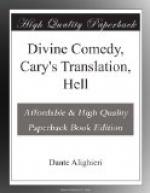Of the old flame forthwith the greater horn
Began to roll, murmuring, as a fire
That labours with the wind, then to and fro
Wagging the top, as a tongue uttering sounds,
Threw out its voice, and spake: “When I
escap’d
From Circe, who beyond a circling year
Had held me near Caieta, by her charms,
Ere thus Aeneas yet had nam’d the shore,
Nor fondness for my son, nor reverence
Of my old father, nor return of love,
That should have crown’d Penelope with joy,
Could overcome in me the zeal I had
T’ explore the world, and search the ways of
life,
Man’s evil and his virtue. Forth I sail’d
Into the deep illimitable main,
With but one bark, and the small faithful band
That yet cleav’d to me. As Iberia far,
Far as Morocco either shore I saw,
And the Sardinian and each isle beside
Which round that ocean bathes. Tardy with age
Were I and my companions, when we came
To the strait pass, where Hercules ordain’d
The bound’ries not to be o’erstepp’d
by man.
The walls of Seville to my right I left,
On the’ other hand already Ceuta past.
“O brothers!” I began, “who to
the west
Through perils without number now have reach’d,
To this the short remaining watch, that yet
Our senses have to wake, refuse not proof
Of the unpeopled world, following the track
Of Phoebus. Call to mind from whence we sprang:
Ye were not form’d to live the life of brutes
But virtue to pursue and knowledge high.
With these few words I sharpen’d for the voyage
The mind of my associates, that I then
Could scarcely have withheld them. To the dawn
Our poop we turn’d, and for the witless flight
Made our oars wings, still gaining on the left.
Each star of the’ other pole night now beheld,
And ours so low, that from the ocean-floor
It rose not. Five times re-illum’d, as
oft
Vanish’d the light from underneath the moon
Since the deep way we enter’d, when from far
Appear’d a mountain dim, loftiest methought
Of all I e’er beheld. Joy seiz’d
us straight,
But soon to mourning changed. From the new land
A whirlwind sprung, and at her foremost side
Did strike the vessel. Thrice it whirl’d
her round
With all the waves, the fourth time lifted up
The poop, and sank the prow: so fate decreed:
And over us the booming billow clos’d.”
CANTO XVII
Now upward rose the flame, and still’d
its light
To speak no more, and now pass’d on with leave
From the mild poet gain’d, when following came
Another, from whose top a sound confus’d,
Forth issuing, drew our eyes that way to look.
As the Sicilian bull, that rightfully
His cries first echoed, who had shap’d its mould,
Did so rebellow, with the voice of him
Tormented, that the brazen monster seem’d
Pierc’d through with pain; thus while no way
they found
Nor avenue immediate through the flame,
Into its language turn’d the dismal words:
But soon as they had won their passage forth,
Up from the point, which vibrating obey’d
Their motion at the tongue, these sounds we heard:
“O thou! to whom I now direct my voice!
That lately didst exclaim in Lombard phrase,




